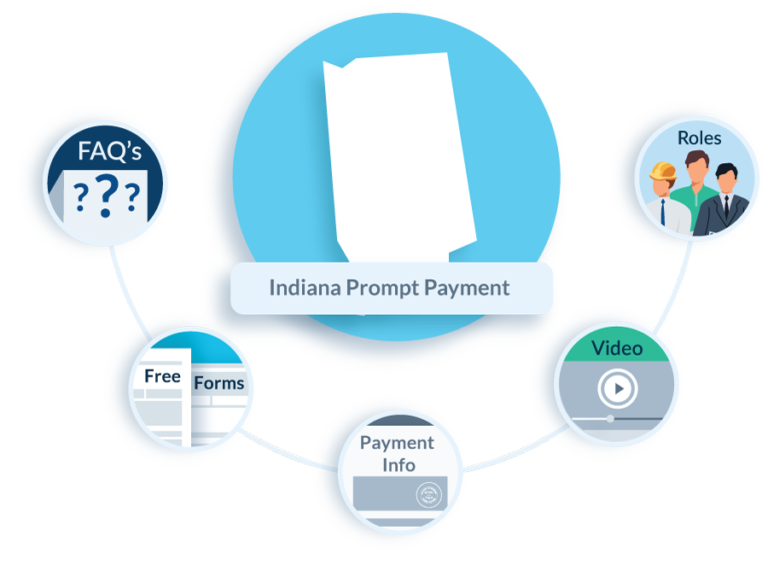Indiana Prompt Payment Requirements
- Private Jobs
- Public Jobs
- Top Links
Prime Contractors
Not specified in state statutes
Subcontractors
Not specified in state statutes
Suppliers
Not specified in state statutes
Interest & Fees
Not specified in state statutes
Prime Contractors
For Prime (General) Contractors, payment due date depends on if the project was local or state. State: progress payment due within 35 days of invoice; and final/retainage payment due within 61 days from substantial completion. Local: Payment due 45 days after invoice.
Subcontractors
For Subcontractors, payment due within 10 days from receipt of payment from above. Note, only applies to first tier subs.
Suppliers
For Suppliers, payment due within 10 days from receipt of payment from above. Note, only applies to first tier subs.
Interest & Fees
Interest 1% month.
Prompt payment laws are a set of rules that regulate the acceptable amount of time in which payments must be made to contractors and subs. This is to ensure that everyone on a construction project is paid in a timely fashion. These statutes provide a framework for the timing of payments to ensure cash flow and working capital.
Projects Covered by Prompt Payment in Indiana
Indiana’s prompt payment laws, found in Ind. Code §§5-17-5-1 et seq. and §§5-16-5.5-0.1 to 5-16-5.5-8; and only apply to public works projects. This includes all state, and municipal/local projects that are contracted for at least $200,000. There are no prompt payment provisions for private projects.
Payment Deadlines for Public Projects
The deadline for payment depends on whether the project is contracted by a state agency or a local one. On state projects, progress payments from the entity to the prime contractor are due within 35 days after receipt of a proper payment request, unless the contract between the parties state otherwise. As for final payments from the entity to the prime on state projects, these must be made within 61 days following substantial completion of the project. For local government projects, all payments from the contracting entity to the prime contractor must be made within 45 days of receipt of a proper payment request.
The deadlines for payment from the prime contractor to their first-tier subs and suppliers don’t change according to the project type. All payments must be made within 10 days of the prime contractor receiving payment. This 10-day turnaround period only applies to first-tier payments. All other payments on public works projects in Indiana are regulated by the contract terms themselves.
Penalties for Late Payment on Public Projects
Payments may be withheld if there is a good faith dispute regarding the quality or quantity of the labor or materials, improper installation, or any other specified reasons giving cause for withholding payment. If no such cause exists, and payment is late or wrongfully withheld, interest will begin accruing at a rate of 1% per month, which is compounded monthly until the payment is made. Meaning at the end of each delinquent month the interest accrued will be added to the principal and begin accruing interest on the increased amount the following month.
